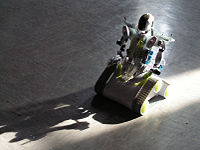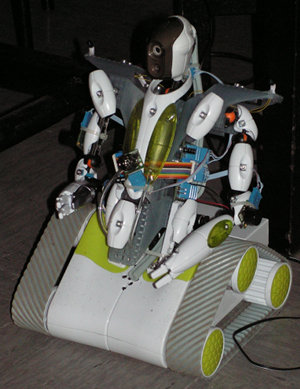Difference between revisions of "RoboWII2.0"
From AIRWiki
m |
m |
||
| Line 1: | Line 1: | ||
| − | + | {{Project | |
| + | | title=RoboWII2.0 | ||
| + | | tutor=AndreaBonarini | ||
| + | | students= AntonioMicali | ||
| + | | resarea=Robotics | ||
| + | | restopic=Robogames | ||
| + | | start=2008/10/08 | ||
| + | | end=2009/09/01 | ||
| + | | level=Bs | ||
| + | | type=Thesis | ||
| + | | status=Closed | ||
| + | | image=SkypeWII2Small.JPG | ||
| + | }} | ||
The aim of this project is to implement a new version of the [[RoboWII1.0|RoboWII1.0]] game, on a low cost robot, more suitable to internal environments, [[Spykee]]. The robot has been equipped with infrared LEDs to be detected by the WIIMote, and with a sonar belt, to detect obstacles. The camera on the robot send images to a remote computer via WI_FI, which can be analyzed. The computer also controls the movements of the robot and the interpretation of data from the WIIMote, connected via BlueTooth. | The aim of this project is to implement a new version of the [[RoboWII1.0|RoboWII1.0]] game, on a low cost robot, more suitable to internal environments, [[Spykee]]. The robot has been equipped with infrared LEDs to be detected by the WIIMote, and with a sonar belt, to detect obstacles. The camera on the robot send images to a remote computer via WI_FI, which can be analyzed. The computer also controls the movements of the robot and the interpretation of data from the WIIMote, connected via BlueTooth. | ||
Revision as of 17:36, 25 October 2009
RoboWII2.0
| |
| Coordinator: | |
| Tutor: | AndreaBonarini (andrea.bonarini@polimi.it) |
| Collaborator: | |
| Students: | AntonioMicali (antonio88m@fastwebnet.it) |
| Research Area: | Robotics |
| Research Topic: | Robogames |
| Start: | 2008/10/08 |
| End: | 2009/09/01 |
| Status: | Closed |
| Level: | Bs |
| Type: | Thesis |
The aim of this project is to implement a new version of the RoboWII1.0 game, on a low cost robot, more suitable to internal environments, Spykee. The robot has been equipped with infrared LEDs to be detected by the WIIMote, and with a sonar belt, to detect obstacles. The camera on the robot send images to a remote computer via WI_FI, which can be analyzed. The computer also controls the movements of the robot and the interpretation of data from the WIIMote, connected via BlueTooth.
This work is done as part of the ROBOWII effort.
Person in charge Antonio Micali

